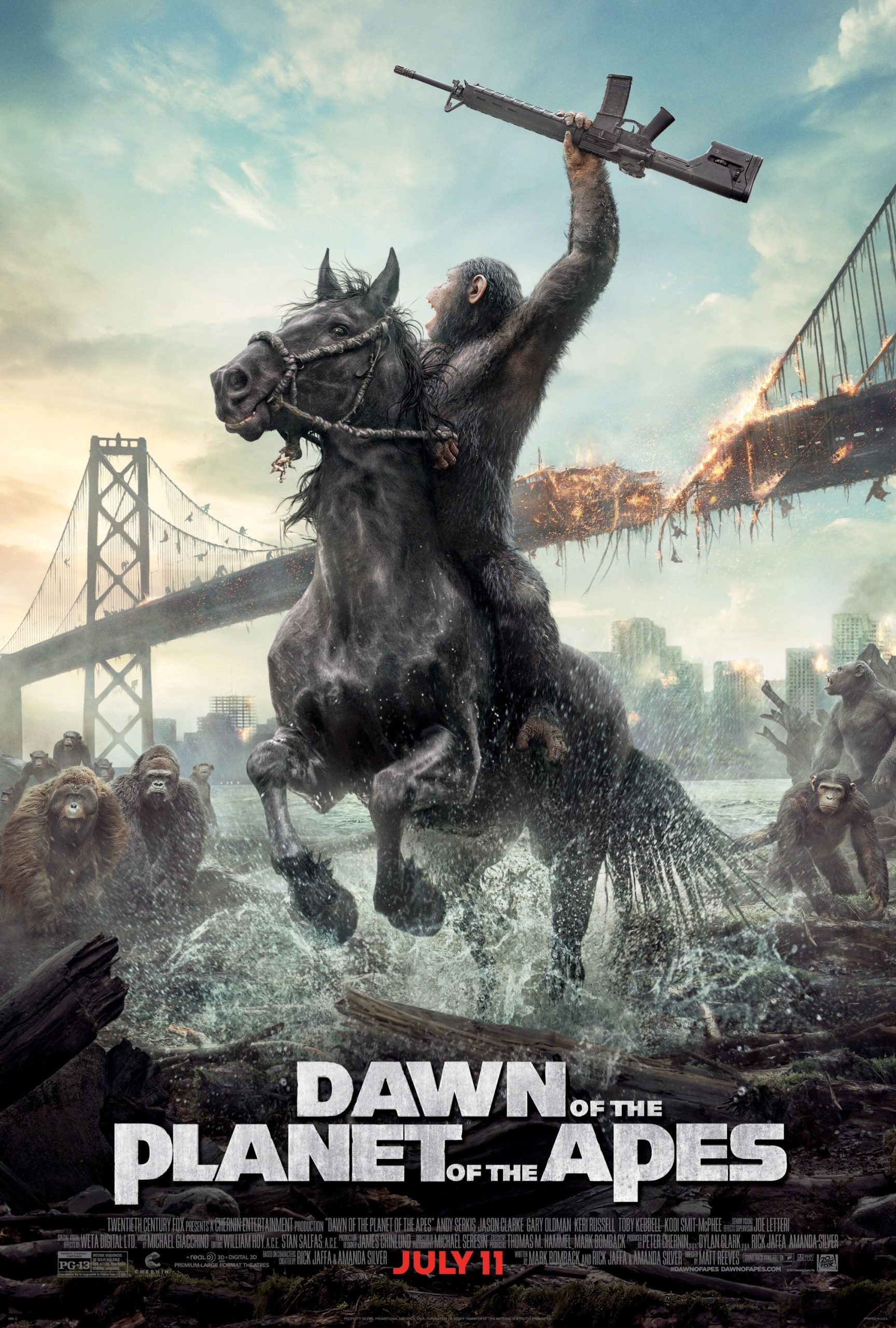Film review by Chlo Hickson
Following on from my Rise of the Planet of the Apes review, the next movie in the trilogy is Dawn of the Planet of the Apes.
Rise of the Planet of the Apes is a great movie, but by taking over the trilogy, Matt Reeves took it to a new level. Darker yet more involving than its predecessor, Dawn of the Planet of the Apes brings a compelling, serious, and emotional story. It is hands down one of the best sequels ever. If you’ve read my review for Rise then you’d know I’m a big fan of that movie, and Dawn is the perfect follow up. Its bigger and better in every way.
Dawn of the Planet of the Apes jumps right into the time when the apes have built a civilisation while mankind is starting to fall apart. It neatly takes over in its opening titles where the closing titles of Rise left off. The Simian flu, previously known as the ALZ-113 in Rise, has wiped out the majority of people, explaining why we have a brand-new leading humans cast led by Jason Clarke and Gary Oldman. These characters are trying to rebuild a new society for the survivors of San Francisco, but their desire for power (technology kind) put them in direct conflict with the apes. Much conflict ensues, not only between the apes and humans but between the apes themselves.
Dawn isn’t as much a sequel to Rise as a fantastic re-imagining of the fifth and final movie in the original series. The plot is basically the same as well. Having won equality and a new start, Caesar attempts to create a civilization where humans and apes can peacefully co-exist. But when an evil ape consumed by race hatred decides to take the law into his own hands, both Caesar’s life and his families future is at stake.
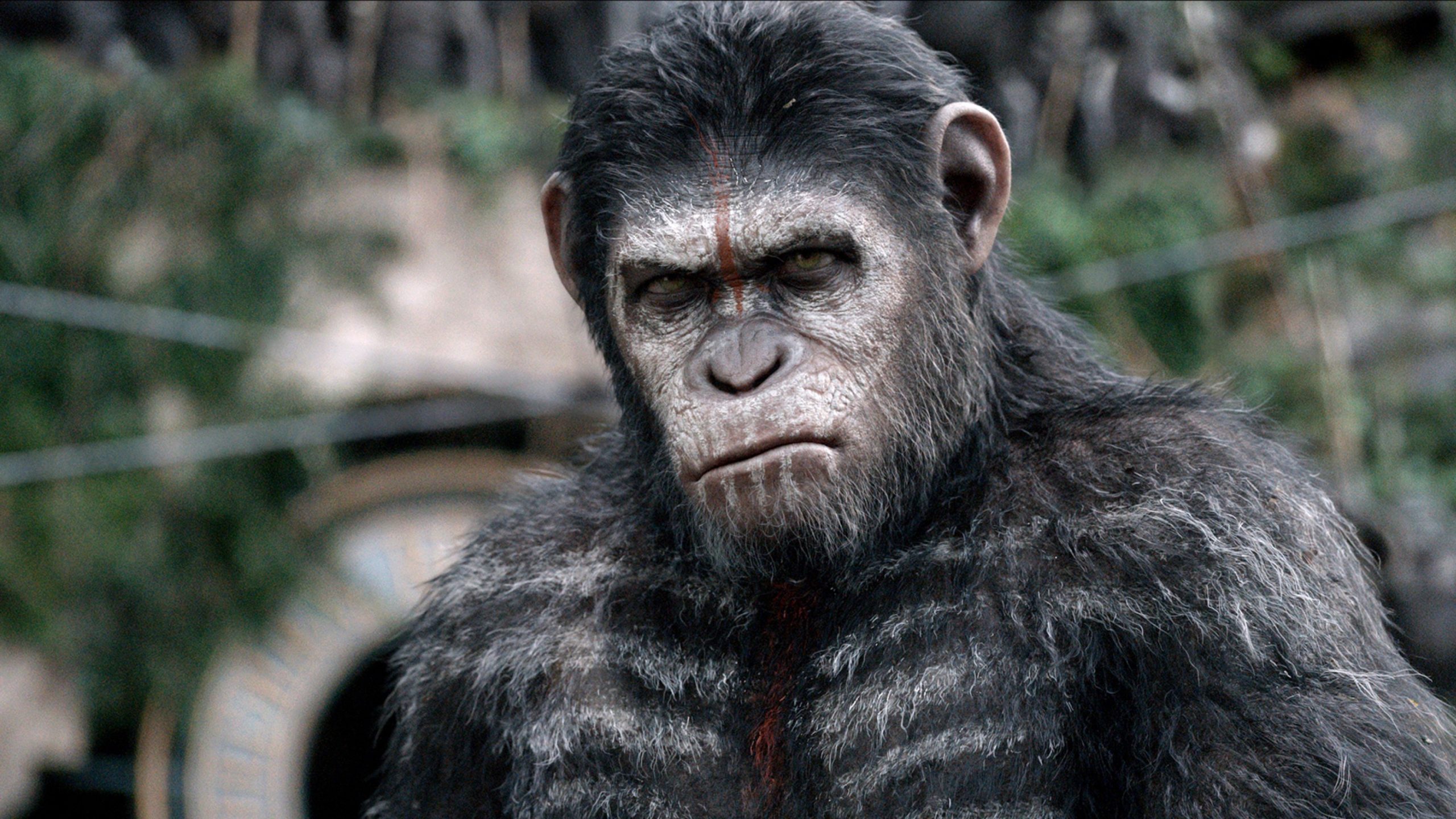 The thing that impressed me with this is that the same plot was more powerful the second time around. The characters are more complex, and the performances more tragic. General Aldo, the gorilla in Battle, plays the same role as Koba in Dawn. But the two characters are so different. Aldo was just a bully and saw himself superior to humans. Koba, with his scars, his blinded eye, and his horrible memories of life as a lab experiment, is a far more tragic figure.
The thing that impressed me with this is that the same plot was more powerful the second time around. The characters are more complex, and the performances more tragic. General Aldo, the gorilla in Battle, plays the same role as Koba in Dawn. But the two characters are so different. Aldo was just a bully and saw himself superior to humans. Koba, with his scars, his blinded eye, and his horrible memories of life as a lab experiment, is a far more tragic figure.
We learn about Koba’s origin in the novel Dawn of the Planet of the Apes: Firestorm and of cause a little bit in Rise. Koba was born and raised at a primate research facility where he was taught sign language from his caregiver Mary, who he was very close to. Koba even identified himself with humans. One day, his mum was beaten to death by a handler who was an alcoholic which resulted with the program Koba was involved with being cancelled. He was then sold to a TV studio under an abusive career called Tommy, here Koba lived with another ape named Milo and together they did a show called Monkey of the House, which if they failed to do this Tommy would electrocute them. The show was cancelled due to poor ratings. Tommy depressed turned to drinking and started to take his anger out on the two apes. He slashed Koba’s face with a knife after he attempted to defend himself then blinded his left eye with a lit cigarette. Eventually Tommy killed himself allowing Koba and Milo to escape but they were caught by animal control. Koba was then separated from his friend and moved to various laboratories where fear of physical abuse got the best of him, and he had self-harming tendencies such as pulling his fur out and injuring his knuckles. It’s after all this that Koba lost his trust in humans. At this point he is living at the Gen-Sys lab and PTSD is seriously affecting him. Koba had his fair share of abuse and trauma and everything that is affecting him now is caused by a human. During the events of Dawn revenge is on his mind and he even accuses Caesar of loving humans more than apes when he allows them to get access to a dam in ape territory. People with PTSD feel irritable and feel like something terrible is about to happen even if they are safe. Consequently, Koba not only hates humans but mistrusts them and feels like they will kill all the apes, this is based on nothing but his personal past experiences of humans, but it defines his vision of the future. Caesar isn’t haven’t it which feeds Koba’s need for revenge. Koba’s PTSD and need for revenge was the most significant factor of the Dawn of the Planet of the Apes.
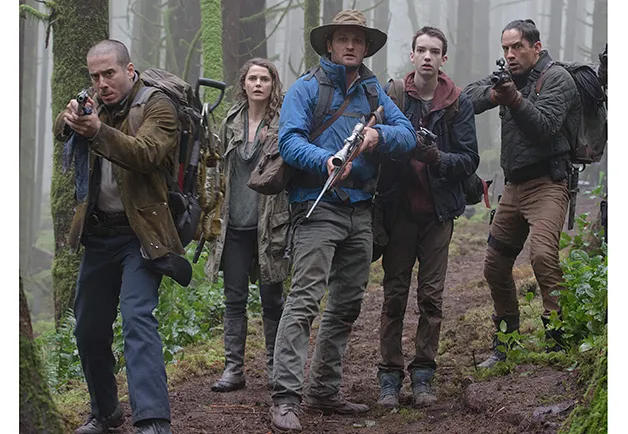 It looks amazing, the cinematography and lighting are of great beauty and atmosphere and the scenery is equally striking. But the visual highlight, and most likely the best thing about the movie are the special effects for the apes. The CGI is very impressive. Serkis is, hands down, the most talented motion capture actor; in this trilogy, he and the production team began to blur the lines between motion capture and reality. At the time of writing this, the film is now ten years old, and it contains some of the best CGI I’ve ever seen. In the first scene we see these apes lining the trees in preparation for a hunt and the texture detail of their fur, skin and eyes is breath-taking. They feel real, even now, and that’s impressive. This scene also takes place in the rain which adds another challenging element, but they manage to pull it off. You can see each individual raindrop effect each individual ape’s fur! What makes it even more incredible is they are distinguishable from each other, and the communication between the apes is staggeringly realistic.
It looks amazing, the cinematography and lighting are of great beauty and atmosphere and the scenery is equally striking. But the visual highlight, and most likely the best thing about the movie are the special effects for the apes. The CGI is very impressive. Serkis is, hands down, the most talented motion capture actor; in this trilogy, he and the production team began to blur the lines between motion capture and reality. At the time of writing this, the film is now ten years old, and it contains some of the best CGI I’ve ever seen. In the first scene we see these apes lining the trees in preparation for a hunt and the texture detail of their fur, skin and eyes is breath-taking. They feel real, even now, and that’s impressive. This scene also takes place in the rain which adds another challenging element, but they manage to pull it off. You can see each individual raindrop effect each individual ape’s fur! What makes it even more incredible is they are distinguishable from each other, and the communication between the apes is staggeringly realistic.
The acting is fantastic. Andy Serkis returns to play the role of Caesar and I honestly think he’s better in this one than he is in Rise. It’s a subtler performance, he’s a lot more intense but is a lot more restrained showing how far Caesar has come since the first movie. It’s ten years later so he’s a much more mature character this time. I really love the arc that we see this character go through, it takes what Battle for the Planet of the Apes tried to do for Roddy McDowall’s version of the character and executes it well. He starts off thinking apes are the superior beings because they don’t succumb to all the faults that humans do, then as the movie progresses you see Caesar come to the conclusion through all his interactions that apes are just like humans. They have the same kind of flaws and if they aren’t careful it can lead to the same thing that the humans are currently going through. I really love this arc. I think it’s fascinating, it’s also powerful too and humanises Caesar even more than what we get in Rise. We see him struggle with this leadership, parenthood and all the things in between, it allows us to sympathise with him on another level and feel the weight of his actions as well as the consequences that surround him and having seen him grow from a baby, our emotional connection is already a strong one. To say that Caesar is one of the greatest leaders in film history isn’t an overstatement. When he is on screen you can’t help but be mesmerised by the immense strength and respectability that comes with the character. But he is still a character in constant evolution, and his relationship with the humans is what drives this movie’s plot. Caesar has grown understanding more how the world works, his sympathy with the humans remains and he can still believe in peace with them and his own kind.
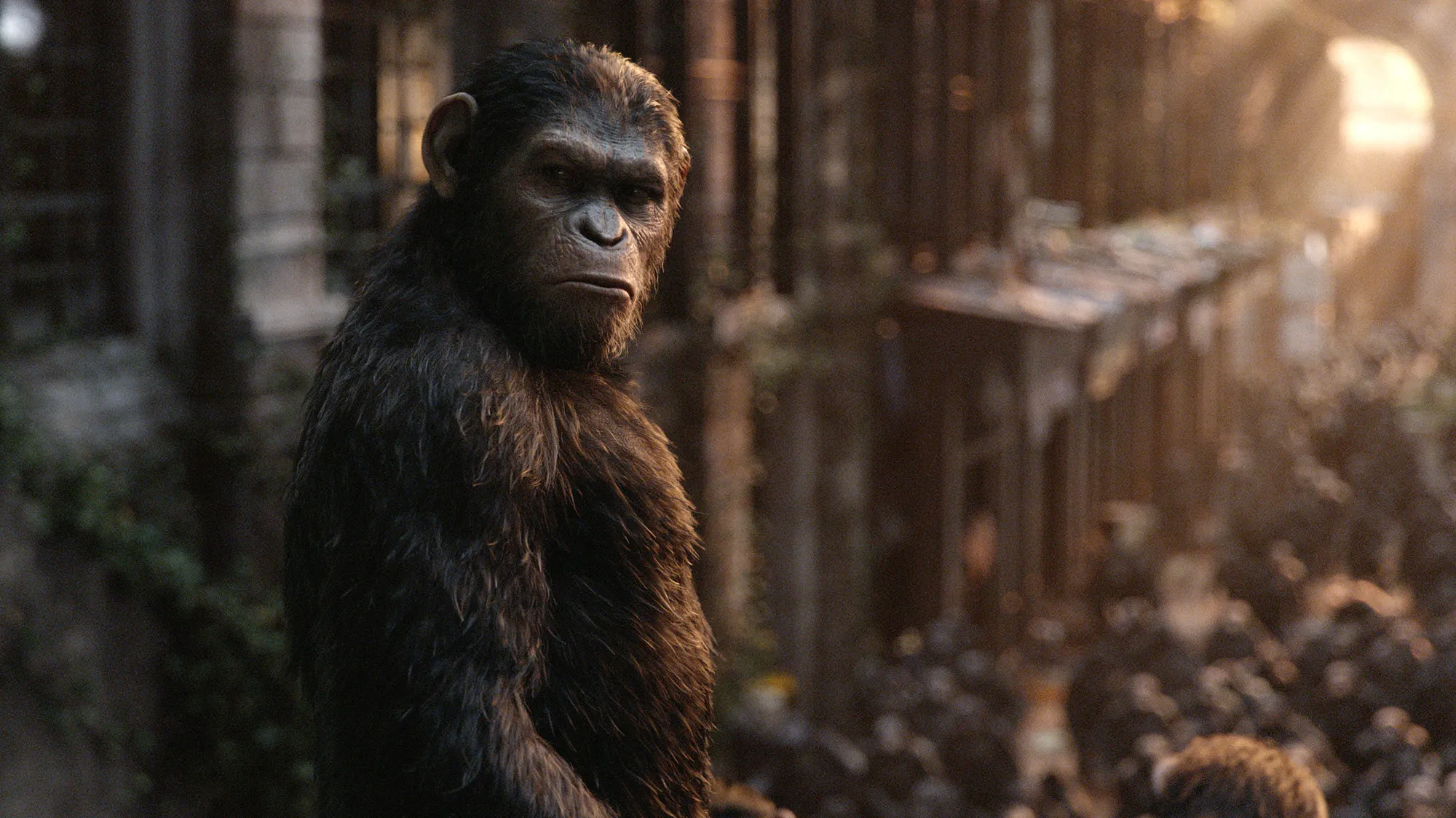 When it comes to the worldbuilding I think this movie does it just as well as the original. You see the progression of ape civilisation and it’s done really well; it’s also done really exciting to look at. I love how ape city looks, how they’ve built everything. It’s starting to have the style of the 1968 film and they’re planting seeds here and there. The ape language is also still evolving so it’s heavy on the sign language. The speaking from the apes is a broken English and is kept to a minimum. I think this was a really smart choice, they didn’t just dive into how we saw the apes in the original franchise. They are still learning.
When it comes to the worldbuilding I think this movie does it just as well as the original. You see the progression of ape civilisation and it’s done really well; it’s also done really exciting to look at. I love how ape city looks, how they’ve built everything. It’s starting to have the style of the 1968 film and they’re planting seeds here and there. The ape language is also still evolving so it’s heavy on the sign language. The speaking from the apes is a broken English and is kept to a minimum. I think this was a really smart choice, they didn’t just dive into how we saw the apes in the original franchise. They are still learning.
There’s a debate when it comes to the human characters. I do think Jason Clarke is a better and more compelling character than Jame’s Franco’s Will Rodman, though I do love his character. I think that Caesar and Malcom have a great relationship that you see unfold through the movie. We also have Ellie who is likable and empathetic, and I think this goes a long way in making the human side of the story more engaging, though she doesn’t get to do a lot.
Michael Giacchino’s musical score is brilliant and is one of my favourite movie soundtracks, its haunting and fits perfectly. It also captures the feeling of The Planet of the Apes as a whole.
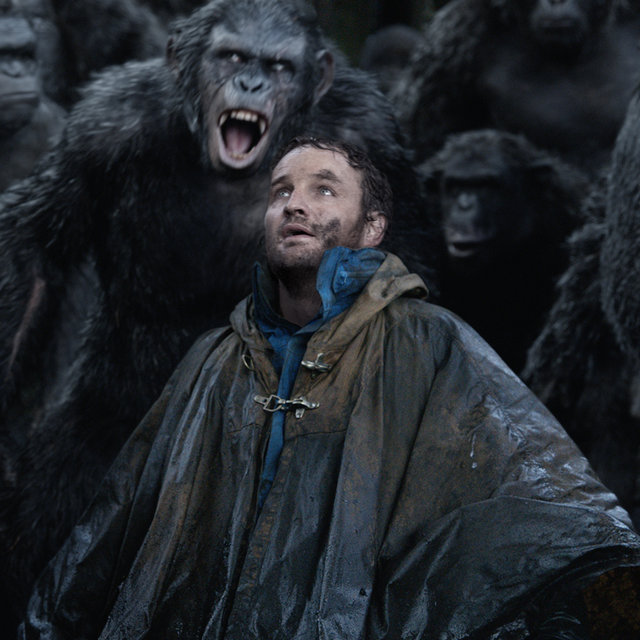 This movie once again sticks to its symbolism. This is far from a story of good vs evil. The real enemy of the conflict is simply fear, distrust, and revenge.
This movie once again sticks to its symbolism. This is far from a story of good vs evil. The real enemy of the conflict is simply fear, distrust, and revenge.
As I mentioned before I liked Rise but Dawn is a film that holds a special place in my heart. It includes profound insights into how conflicts grow, and wars start. Caesar’s growing moral compass is powerful to watch. Also like I mentioned previously, the apes alone are worth seeing this movie for. The relationship between Caesar and Koba is definitely the core of the movie and it’s very well done, making the stand outs of this film Andy Serkis and Toby Kebbell. The tension is obvious through the whole movie and there’s never a dull moment. To me, Dawn of the Planet of the Apes is a masterpiece.

